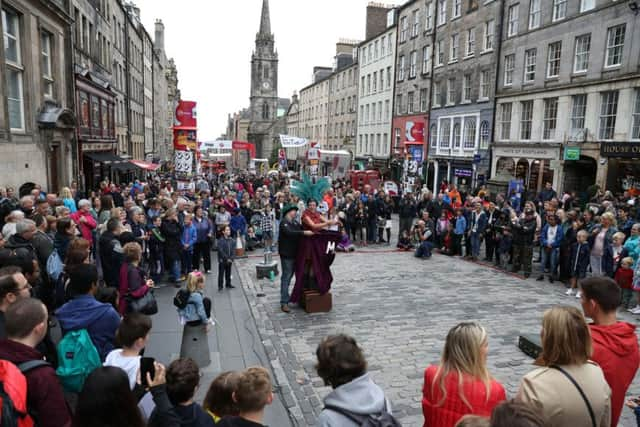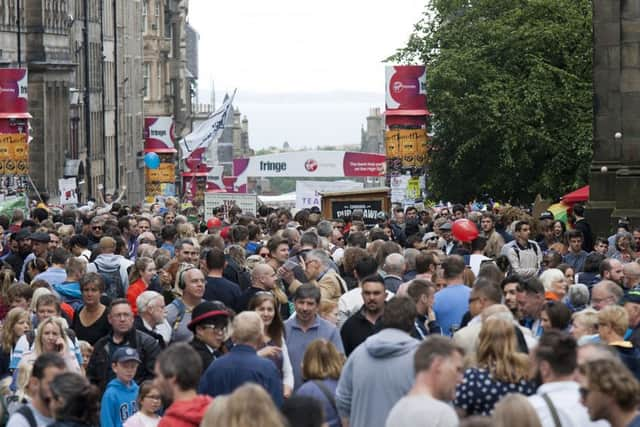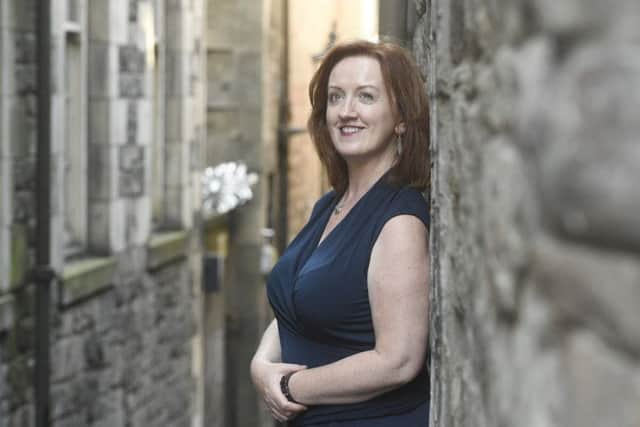Edinburgh Fringe chief: Accommodation prices will '˜kill life-force of festivals'


But anyone arriving in the city for the first time could be forgiven for thinking the world’s biggest arts festival is in full cry such is the throng of tourists and street entertainers outside its headquarters.
Inside, last-minute preparations are being made by the Fringe Society for its 20th year of managing the High Street arena, which will be getting a makeover to coincide with the anniversary.
Advertisement
Hide Ad

A year on from the Fringe’s own 70th birthday celebrations, all the indications are that the event is going from strength to strength, with more shows than ever before set to be staged across a record 317 venues.
But inside her modest office above the festival’s bustling box office, the Fringe Society chief executive Shona McCarthy is warning that complacency over the event’s success is actually the biggest threat to its future.
With nearly 2.7 million Fringe tickets shifted last year, it is no surprise that it is responsible for the vast majority of the £313 million in economic impact now estimated to be generated by Edinburgh’s festivals.


But the Fringe’s success has had a sting in the tail for the Fringe Society and the hundreds of companies it works with every year.
The soaring cost of accommodation has been identified as the major barrier to participation in the event in future on the back of last year’s Fringe – it is regarded as a more serious threat than the looming prospect of Brexit.
The concerns raised by artists, performers, producers and promoters are being treated so seriously by McCarthy they have prompted her to warn that the very “life-force” of Edinburgh in August could be killed off by the dramatic cost of staying in the city.
Advertisement
Hide AdRather than bring down the cost of accommodation, the opening of new budget hotels across the city centre and the Airbnb boom for the private accommodation sector seem to have simply sent prices soaring even further.


McCarthy has thrown down the gauntlet by asking for a “city-wide effort and commitment” to help curb the cost of staying in Edinburgh in August.
Advertisement
Hide AdShe also wants a collective effort to be made to ensure Edinburgh is treated as a year-round capital of culture by all the main agencies in the city and for the arts to be given similar billing to the heritage of the Scottish capital.
Appointed two and a half years ago, McCarthy had been responsible for Derry-Londonderry’s year as the first ever UK City of Culture and led Belfast’s bid to become a European Capital of Culture.
As she prepares to take the helm of the event for the third time, she admits to some frustration that the make-up of the Fringe is “misunderstood”.
“I don’t think people realise that the Fringe Society is a charitable organisation that only has 24 people working for it or that the Fringe is full of completely different business models,” she said.
“There are big venues with big commercial acts in them, but there are also hundreds of free and pay-what-you-want shows, and free street events. It’s such an eclectic mix of every possible business model. It is a phenomenon.
“I think people just make assumptions about what it is and how it operates. We need to do more to clearly and transparently articulate how this festival works. It’s not a curated and programmed publicly funded festival. It’s a range of people taking real risks to bring work here.”
Advertisement
Hide AdAlthough there is widespread accommodation still available at many of the city’s top hotels this weekend, the prices are hovering near the £500 mark for a one-night stay. Budget chains are asking more than £200 for a room on Princes Street or the Royal Mile.
Bringing down the cost of accommodation in Edinburgh in August has been identified as one of the biggest priorities for the Fringe in a new five-year plan.
Advertisement
Hide AdMcCarthy, who told tourism industry leaders earlier this year that the city had to take more care to provide a “supportive landscape” for the Fringe, admits the issue is not a new one.
But she insists there has never been a collective push to tackle the soaring cost of accommodation to ensure the event remains “affordable and accessible to all”. She said: “At the heart of the Fringe are the artists and creative people who come and make work here.
“They are the driving force for all of the other economic impacts across the city in August.
“The moment at which it becomes too expensive for artists to spend the entire month here, or do even part of a run in Edinburgh, will kill off the very thing that drives it all in the first place.
“A city that is so proud of its festivals because of their positive global reputation, their economic impact, cultural impact and social impact has to be really careful to preserve them.
“The cost of accommodation has the potential to be the defining barrier to participating in the Fringe unless everyone is acutely aware of it.
Advertisement
Hide Ad“I’m aware some people think: ‘Well, there’s nothing you can do, it’s down to market forces and what can the Fringe Society do about that?’
“I think that’s just complacency. If we don’t take a leadership role around it who will?”
Advertisement
Hide AdThe launch of the 2018 Fringe programme last month was accompanied by the unveiling of a five-year blueprint for the future of the event.
Key aims i
